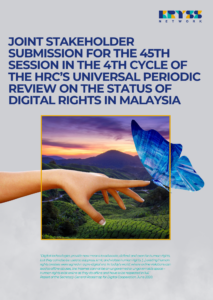
“Digital technologies provide new means to advocate, defend and exercise human rights, but they can also be used to suppress, limit, and violate human rights. […] existing human rights treaties were signed in a pre-digital era. In today’s world, where online violations can lead to offline abuses, the Internet cannot be an ungoverned or ungovernable space – human rights exist online as they do offline and have to be respected in full.”
– Report of the Secretary-General Roadmap for Digital Cooperation, June 2020.
In today’s interconnected world, the line between “online” and “offline” has blurred, as digital technologies have become an inseparable part of our daily lives. As a result, the protection of digital rights is fundamentally intertwined with safeguarding human rights. Digital rights encompass a range of fundamental liberties, including freedom of expression, privacy, access to information, and the right to participate in the digital sphere without discrimination or censorship.
The increasing advancement of digitalisation has transformed the way we communicate, work, access information, and engage in civic activities. Social media platforms, online communities, and digital services have become essential tools for self-expression, education, and participation in public discourse. However, with the growing integration of digital technologies into various aspects of our lives, the risks associated with the abuse and violation of digital rights have escalated.
Over the years, Malaysia has experienced a concerning rise in threats to digital rights, exacerbating issues such as the widening digital divide, numerous data leaks, encroachments on freedom of expression online and others. These challenges have raised serious concerns about the protection of citizens’ privacy, access to information, and the ability to freely express themselves online.
There is a need to protect and promote our digital rights to ensure that individuals have the freedom to navigate the digital landscape without fear of surveillance, censorship, or discrimination as upholding digital rights ensures that every peoples in Malaysia can fully enjoy the benefits of digital technologies without fear of repression or discrimination, ultimately promoting human dignity, autonomy, and the values at the core of human rights principles.
This submission presents an overview of the status of human rights in digital spaces in Malaysia, including on: meaningful access and the digital divide; right to privacy and data protection; online gender-based violence; freedom of expression and right to information; hate speech and targeting vulnerable groups such as indigenous peoples, among others; and climate change and labour rights.
Read our joint submission to know more!

